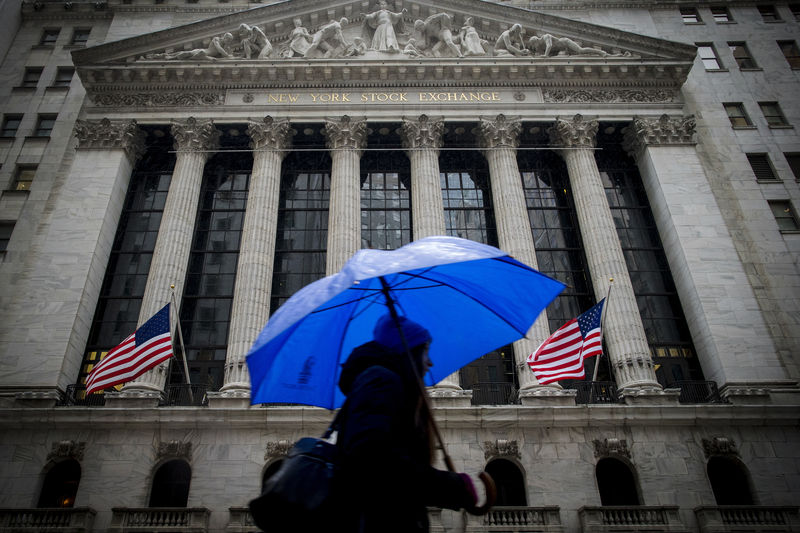Investing.com — Investors’ gazes are fixed on U.S. October inflation figures due out on Tuesday, which could provide some clarity into the Federal Reserve’s interest rate plans. Meanwhile, Home Depot (NYSE:) is set to deliver its latest quarterly earnings, starting off a crush of financial reports from some of America’s largest retail chains this week.
1. Inflation print ahead
Highlighting the economic calendar on Tuesday will be the much-anticipated release of the October U.S. consumer price index (CPI), with investors attempting to map out the potential path ahead for Federal Reserve monetary policy.
A closely-watched gauge of inflation in the world’s largest economy, the CPI reading is expected to rise by 3.3% on an annualized basis. The measure is seen increasing at 0.1%.
The core figure, which takes out more volatile items like food and energy, is seen at 4.1% and 0.3% .
Bringing inflation back down to 2% has been the major objective of a long-standing series of interest rate hikes by the Fed, so policymakers will likely be keen to see signs that price pressures are cooling. However, officials have flagged that they may be open to further tightening if inflation remains elevated.
2. Futures steady with inflation data looming
U.S. stock futures edged up on Tuesday as investors awaited the publication of the CPI print.
By 04:57 ET (09:57 GMT), the contract had risen by 39 points or 0.1%, had added 9 points or 0.2%, and gained 47 points or 0.3%.
The main indices on Wall Street were mixed to end the prior session. The 30-stock added 0.2%, while the benchmark dipped by 0.1% and the tech-heavy shed 0.2%.
The all-important was at 4.617%, down from a one-week peak of 4.696% reached on Monday.
3. Home Depot to report
A series of big-box U.S. retailers are due to report their quarterly earnings this week, starting off with Home Depot on Tuesday.
The home improvement chain’s results will come as an indication of whether higher interest rates and sticky inflation have left American consumers wary of spending big on major projects heading into the key holiday shopping season.
Atlanta-based Home Depot is seen posting earnings of $3.76 per share, according to Bloomberg consensus estimates. Comparable sales are expected to slip by 3.31%.
In the second quarter, the company’s per-share income of $4.65 topped projections, while chief executive Ted Decker said there were “a lot of positives” in the macroeconomic outlook. At the time, Home Depot also maintained its previously-lowered full-year financial forecasts, with Decker telling analysts that “we still see enough uncertainty […] not to revise our guidance.”
4. Yellen speaks at APEC summit
U.S. Treasury Secretary Janet Yellen said finance ministers from Asia-Pacific Economic Cooperation countries affirmed a goal to achieve sustainable growth in their respective economies.
Speaking after a meeting of the ministers at the APEC summit in San Francisco, Yellen that the group’s members — which include both the U.S. and China — backed “a shared interest in pursuing policies that expand the productive capacity of our economies while also achieving outcomes like reducing inequality and protecting the environment.”
She added that the other APEC economies “recognize[d] the potential” of a legislative push by U.S. President Joe Biden’s administration to promote investment in areas like infrastructure, clean energy and semiconductors.
The APEC finance ministers’ gathering comes ahead of a crucial meeting between Biden and his Chinese counterpart Xi Jinping, with tensions high between the world’s two largest economies over a range of issues from Taiwan to trade.
5. Oil prices choppy
Oil prices oscillated around the flatline on Tuesday, with traders gearing up for fresh U.S. inflation data that could have an impact on the outlook for demand in the world’s largest crude consumer.
By 04:58 ET, the futures traded 0.1% higher at $78.33 a barrel, while the contract inched up 0.02% to $82.54 a barrel.
A faster-than-anticipated CPI print “would reinforce the higher-for-longer narrative when it comes to interest rates,” analysts at ING said in a note, adding that “any surprises to the upside would likely put some pressure on risk assets, including commodities.” In theory, elevated borrowing costs could weigh on broader economic activity, potentially denting demand.
Elsewhere, the predicted that the oil market could return to a surplus early next year despite extended production cuts by Saudi Arabia. The IEA said that a recent draw in oil stockpiles that was fueled by Saudi Arabia’s output reductions could begin to change course due to sluggish economic growth.
The oil watchdog added: “For now, with demand still exceeding available supplies heading into the Northern Hemisphere winter, market balances will remain vulnerable to heightened economic and geopolitical risks.”
Read the full article here








